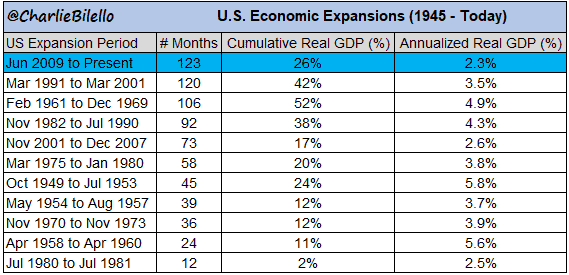Are you ready for a recession? A survey says probably not

JPMorgan Chase Chief Executive Jamie Dimon warned Tuesday a recession may be on the horizon thanks to the continuing trade tensions with China.
“Of course there’s a recession ahead,” Dimon said during a morning call with reporters after the bank announced its third-quarter earnings. “What we don’t know is if it’s going to happen soon. As you can see in the chart below, we are currently in the longest period of economic expansion in the history of the US.
However, according to a recent survey by bankrate.com 2 out of 5 Americans are not financially prepared for an economic downturn if it were to happen in the next 6 to 12 months. This lack of readiness comes at a time when the American economy is full of uncertainty. The Fed has cut rates twice this year to cushion the economy and experts are betting that there might be another cut as well when the Fed meets again in 2 weeks.
So, what can you do to make sure you are prepared for a recession if it were to happen?
First, you should pay off high-interest debts and boost your emergency savings. An emergency fund is key if an economic downturn leaves you strapped for cash or a potential loss of income. Americans should also cut down on overall spending. You might want to consider having funds automatically put into a savings account from each paycheck.
As to be expected, those with higher incomes feel more secure about their financial position if a recession were to occur. Those that are more comfortable financially have the ability to look ahead and tend to be more goal-oriented. Typically, those that can pay their bills without much concern also have the ability to be more mindful of their spending and can build their savings funds to better prepare in the event of a job loss or other emergency.
For those living paycheck-to-paycheck, it is much more difficult to prepare for a downturn. At a minimum, limiting any “wants” and putting aside even an extra $1 a day can be helpful is starting to build that emergency fund.
Having a strong financial mindset is the most important factor in trying to save for an economic downfall. You should limit what you spend and control what you save. Being proactive about your money, instead of reactive, will put you in a better position to prepare for downside risk.
I can’t tell you when the next recession will happen with any accuracy. Neither can the TV pundits or even the best economists. But we know that it will happen again. Real businesses will fail. Start with a plan based on your individual situation, prioritizing the following things:
- Building up emergency savings and paying off expensive debt
- Maximizing your professional value and prospects
- Allocating your portfolio based on your goals and not on how the market is doing right now
Your priorities and the plan you make will be unique to you. But once you put it into action, it should help you minimize the harm from a recession, bounce back quickly, and even grow your wealth. The simple act of putting a plan into action — giving yourself something to do — will improve your prospects of coming out of the next recession unscathed.

